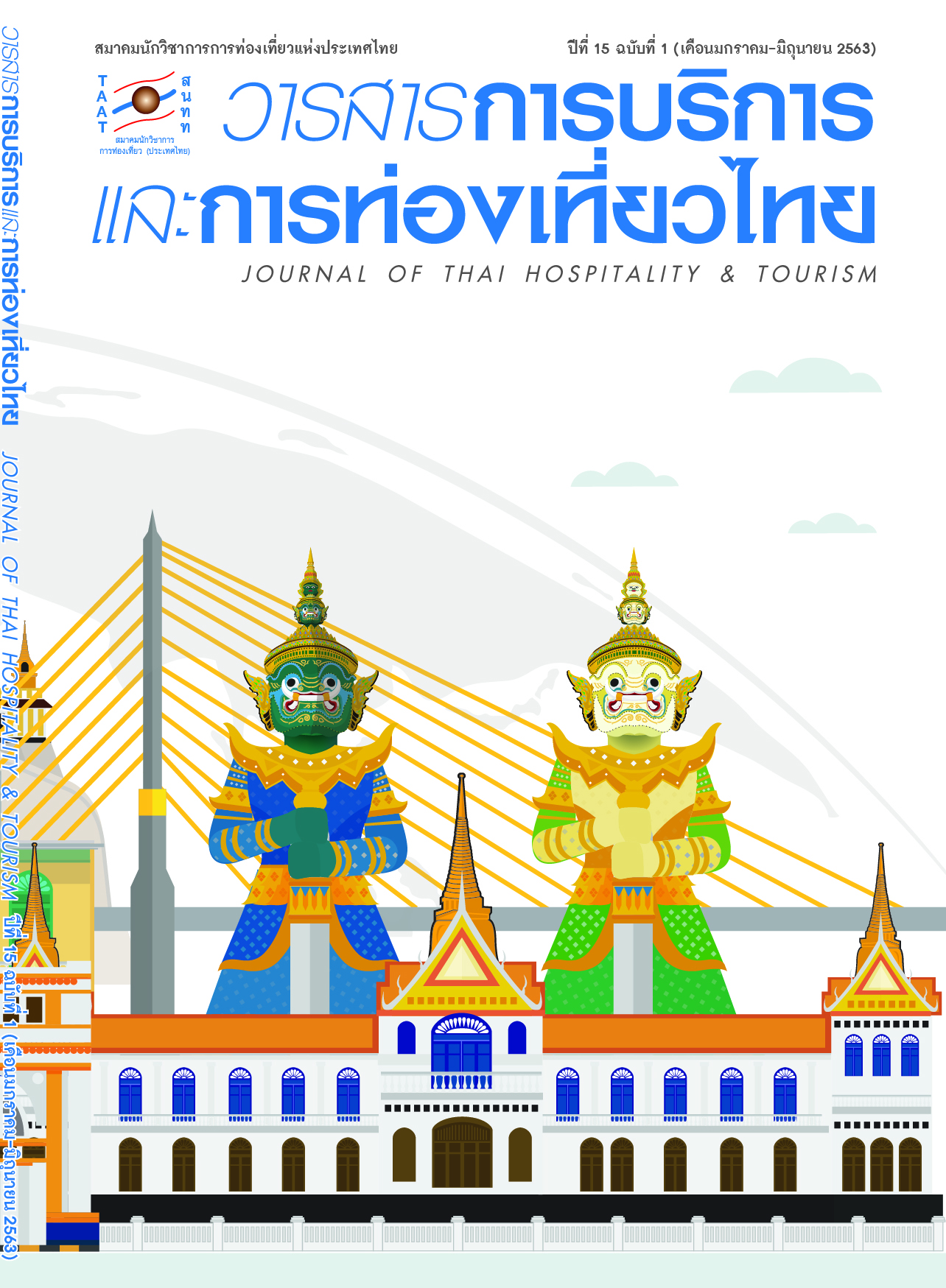องค์ประกอบพฤติกรรมของนักท่องเที่ยวในช่วงวินาทีแห่งความประทับใจก่อนตัดสินใจจองโฮมสเตย์ในภาคใต้
Main Article Content
บทคัดย่อ
งานวิจัยนี้ มีวัตถุประสงค์เพื่อวิเคราะห์องค์ประกอบพฤติกรรมของนักท่องเที่ยวในช่วงวินาทีแห่งความประทับใจก่อนตัดสินใจจองโฮมสเตย์ในภาคใต้ โดยกลุ่มตัวอย่างการวิจัย ได้แก่ นักท่องเที่ยวที่เข้าพักโฮมสเตย์ในภาคใต้ จำนวน 343 คน กำหนดกลุ่มตัวอย่างแบบสะดวกสบาย เครื่องมือในการวิจัย คือ แบบสอบถามพฤติกรรมในการค้นหาและเลือกใช้ข้อมูลของนักท่องเที่ยวก่อนตัดสินใจของโฮมสเตย์ในภาคใต้ ที่วิเคราะห์ค่าความเชื่อมั่นของแบบสอบถามทั้งฉบับ ตามวิธีของ Cronbach ได้ค่าสัมประสิทธิ์ความเที่ยงแบบสอบถามเท่ากับ .9194 สถิติสำหรับการวิจัยในครั้งนี้ ได้แก่ การวิเคราะห์องค์ประกอบเชิงสำรวจ (Exploratory Factor Analysis) ในการหาองค์ประกอบพฤติกรรมของนักท่องเที่ยวในช่วงวินาทีแห่งความประทับใจก่อนตัดสินใจจองโฮมสเตย์ในภาคใต้
ผลการศึกษาพบว่า องค์ประกอบพฤติกรรมของนักท่องเที่ยวในช่วงวินาทีแห่งความประทับใจก่อนตัดสินใจจองโฮมสเตย์ในภาคใต้ มี 6 องค์ประกอบ ได้แก่ องค์ประกอบที่ 1: สิ่งสนับสนุนการตัดสินใจ ประกอบด้วยตัวแปรด้านพฤติกรรม 11 ตัว องค์ประกอบที่ 2: การหาข้อมูลหลักเกี่ยวกับโฮมสเตย์ ประกอบด้วยตัวแปรด้านพฤติกรรม 7 ตัว องค์ประกอบที่ 3: การหาข้อมูลโฮมสเตย์เพื่อยืนยัน ประกอบด้วยตัวแปรด้านพฤติกรรม 4 ตัว องค์ประกอบที่ 4: การเลือกใช้ข้อมูลที่มีคุณภาพ ประกอบด้วยตัวแปรด้านพฤติกรรม 3 ตัว องค์ประกอบที่ 5: การพูดคุยโดยตรง ประกอบด้วยตัวแปรด้านพฤติกรรม 2 ตัว และองค์ประกอบที่ 6: การรับฟังคำแนะนำและการบอกต่อ ประกอบด้วยตัวแปรด้านพฤติกรรม 2 ตัว โดยทั้ง 6 องค์ประกอบสามารถอธิบายช่วงวินาทีแห่งความประทับใจก่อนตัดสินใจจองโฮมสเตย์ในภาคใต้ ได้ ร้อยละ 37.32 9.88 8.35 5.23 4.94 และร้อยละ 4.29 ตามลำดับ
Article Details
เอกสารอ้างอิง
Aichner, T. (2012). The Zero Moment of Truth in Mass Customization. International Journal of Industrial Engineering and Management, 3(4), 173–178.
Department of Tourism. (n.d.). Home Stay Standard Thailand. Retrieved December 20, 2015, from https://www.homestaythai.net/
Kang, M. & Schuett, M. A. (2013). Determinants of Sharing Travel Experiences in social Media. Journal of Travel & Tourism Marketing, 30, 1–15.
Lecinski, J. (2011). Winning the Zero Moment of Truth. Google Inc. The United States.
Moritz, D. (2015). 6 Ways to Use Short Video for Social Marketing. Retrieved December 23, 2015, from https://www.socialmediaexaminer.com/use–short–video–for–social–marketing/.
Natthira Amponpan. (2012). Online Marketing Promotion for Tourist Attractions Trends in 2012. Retrieved December 25, 2015, from https://www.tatreviewmagazine.com/web/menu–read–web–etatjournal/menu–2012/menu–2012–jul–sep/454–32555–travel–marketing–online.
Siripen Yiamjanya. (2014). Factors for the Adoption of Electronic Marketing of Homestay Entrepreneurs: The Case of Bang Konthee District, Samut Songkram Province. Retrieved August 26, 2015, from https://www.academia.edu/7270772/Factors_for_the_Adoption_of_Electronic_Marketing_of_Homestay_Entrepreneurs_The_Case_of_Bang_Konthee_District_Samut_Songkram_Province.
Song, S. & Yoo, M. (2016). The Role of Social Media during the Pre–purchasing Stage. Journal of Hospitality and Tourism Technology, 7(1), 84–99.
Wang, X. (2015). Research on Business of Travel Agency Based on Tourist Behavior. In Proceeding of International Interdisciplinary Business–Economics Advancement Conference, USA, November 16–21, 2015, pp.281–288.


